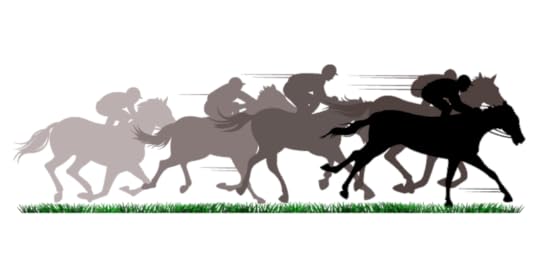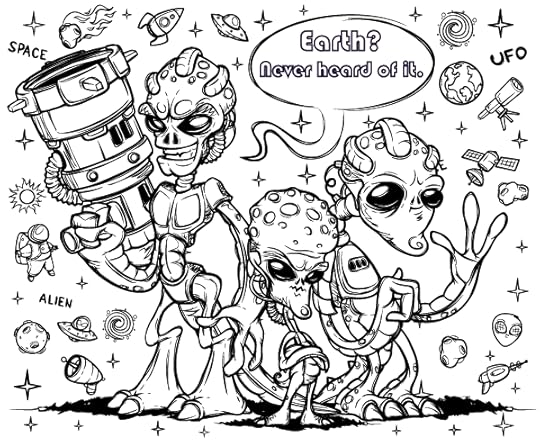S.K. Dunstall's Blog, page 30
October 29, 2016
First Tuesday in November
A horse race.
It’s a public holiday here in Melbourne.* In all of the state, now, I think, although it used to be only the metropolitan area. I remember as a child having an extra-long afternoon recess at school, so the teachers could listen to the cup. They even broadcast the race over the loudspeakers. As a child I never really ‘got’ it, but now that I’ve lived in Melbourne (more years than I lived in the country), it’s an institution.
In fact, Melbourne spring used to start with the AFL grand final and Melbourne fashion week, and segue into the Spring Racing Carnival. After that it was Christmas.
Nowadays, Christmas preparations start way earlier. There’s also Halloween, which we’d heard of when we were younger, but it wasn’t a thing Australians did. In the last few years has suddenly become huge. (If someone knocks on my door trick or treating, I have no idea what to do.)
You have to experience cup week at least once in your life. It’s a crazy time of parties, girls with hats and beautiful dresses, and impossible shoes (and flat heels in their bag if they’re truly wise), and guys in classy suits.
The weather is usually crazy. Mostly it either pours rain or it’s so hot everyone gets sunburned. There’s hardly ever just a nice day. One year you watch the racegoers coming home sodden, the next year they’re bright red from sunburn.
Confession, I have never been to the actual race. Or to Oaks (Ladies) day, which is on the Thursday. It’s too crowded for me. The closest I have been is at the station as the train disgorges hundreds and hundreds of post-race goers. So many that even when they get off the train they’re jammed so tightly onto the platform some of them can’t move.
But I do watch the race of course. And partake in a cup sweep or two.
So come Tuesday at three pm, I’ll be like most of the rest of Australia. Watching a horse race on television somewhere.
* We also had a public holiday this year for the football grand final. We Victorians have our priorities down well. 
October 22, 2016
Living in my own science fiction future
Sometimes I feel I’m living in my own science fiction story, but I don’t realise it.
Computers, credit cards, mobile phones, microwave ovens, genetically modified wheat and other plants, 3-D printers, military drones (military anything, really), tablet PCs. The list goes on.
While it’s true some of these were invented before I was born, they only became common in my lifetime.
We haven’t got self-driving cars yet, but here’s hoping we get to them before I get too old to drive. Believe me, I’ll be first in line.
But for someone born in the year 2000 however, their science fiction will be different.
They grew up with computers, so that’s not science fiction to them. Mobile phones, the internet. They’re part of life, in the same way electricity and washing machines are to me.
For them it will be self-driving cars (I hope), commercial trips to the moon (maybe), genetic modification of people (maybe) and a whole slew of other things that I haven’t even thought of yet but some science fiction writer probably has.
Friday’s internet denial of service attack feels like something out of science fiction. Maybe an apocalyptic novel, or a near future thriller that threatens an apocalypse.
I work in IT. I also run a blog. Which means I know about denial of service attacks. In fact, most Australians do now, for our last census (#CensusFail) was spectacularly disrupted by a denial of service issue.
While we weren’t hit anywhere near as severely as the US last night, it does make you think about how much we rely on the ability to be online all the time. And when we do get an outage, how much it impacts us.
It’s a different world to pre-1980, back before the internet as we know it didn’t exist. Back then Friday’s events would definitely have been science fiction.
Save
October 15, 2016
What alien am I answers
Last week we gave you a quiz: What alien am I? This week we give you answers.
Alien One
 My people (a whole ship of them) are stranded on a distant planet (Earth) and we want to go home. We have membranous bodies that can’t survive long in the new planet’s atmosphere. We survive by finding hosts to inhabit. Over the millions of years we have been on this world our people have split into two factions. Now we’re at war, and using our human hosts to fight the war for us.
My people (a whole ship of them) are stranded on a distant planet (Earth) and we want to go home. We have membranous bodies that can’t survive long in the new planet’s atmosphere. We survive by finding hosts to inhabit. Over the millions of years we have been on this world our people have split into two factions. Now we’re at war, and using our human hosts to fight the war for us.
Unfortunately, my last host was betrayed by one of my people who went over to the enemy. I had to find a new host in a hurry.
Tao, from the Lives of Tao, by Wesley Chu. Tao is a Quasing, an alien race that can’t live outside of another body (on Earth, anyway). One might call them parasites, although the Quasing themselves might refer to themselves as symbionts.
Alien Two
 We begin life as female, become male once our egg-laying years are over and change to something else again at the end of our life. I am currently male. I look like an otter crossed with a gecko, but I walk like a six-legged caterpillar.
We begin life as female, become male once our egg-laying years are over and change to something else again at the end of our life. I am currently male. I look like an otter crossed with a gecko, but I walk like a six-legged caterpillar.
Dr Chef, a Grum, from The Long Way to a Small and Angry Planet by Becky Chambers.
Chambers’ book has been described as Firefly crossed with Guardians of the Galaxy. This is probably not the time to confess that I only saw Firefly about six months ago, when Netflix came to Australia.
Alien Three
 I like meat—human, my own race—I’ll eat anything. Although, of course, marines do not eat other marines.
I like meat—human, my own race—I’ll eat anything. Although, of course, marines do not eat other marines.
My race has prehensile toes so I don’t like boots.
I can hack into any military system. I am loyal to my staff/gunnery sergeant.
The alien in question, Ressk, one of the Krai from Tanya Huff’s Confederation of Valor series. I love Staff (later Gunny) Sergeant Torin Kerr. If I ever have to suggest military science fiction to someone who has never read it before, this is the series I recommend. It’s lighter than some, which makes it a good introduction to the sub-genre.
Alien Four
 I am the captain of an alien fleet. I am being shot at by humans. I surrender.
I am the captain of an alien fleet. I am being shot at by humans. I surrender.
The one, the only, the late, great, Terry Pratchett. Specifically, the ScreeWee captain from Only You Can Save Mankind.
It’s a little dated now–anything with computers dates fast, and back in the nineties, when this book was written, computers were in their infancy. But the Johnny Maxwell books are some of my favourite Terry Pratchett books.
Alien Five
 I look like a big pink erector set. My favorite pastime is fining the humans on my planet. I use the money from the fines to buy umbrellas, field glasses and slot machines.
I look like a big pink erector set. My favorite pastime is fining the humans on my planet. I use the money from the fines to buy umbrellas, field glasses and slot machines.
I got the description for this one out of the book, but if you look at the cover, our alien isn’t pink, and he doesn’t look like a crane (which is what I imagine an erector set is, because it’s not a word we use here in Australia).
Bult, the alien from Connie Willis’s Uncharted Territory. This is one of Willis’s lighter books. Think Crosstalk, or some of her novellas and short stories like All Seated on the Ground, or Inside Job.
Save
So there’s the list. How many did you get?
Save
Save
Save
Save
Save
Save
Save
Save
Save
October 8, 2016
Quiz: What alien am I?
We haven’t had a quiz for a while, so here are five aliens from books for you to identify.
Some of them are a little obscure, but they’re all from books we have in our library.
And no, it doesn’t include any aliens from Alien. Or ET.
Alien One
My people (a whole ship of them) are stranded on a distant planet (Earth) and we want to go home. We have membranous bodies that can’t survive long in the new planet’s atmosphere. We survive by finding hosts to inhabit. Over the millions of years we have been on this world our people have split into two factions. Now we’re at war, and using our human hosts to fight the war for us.
Unfortunately, my last host was betrayed by one of my people who went over to the enemy. I had to find a new host in a hurry.
Alien Two
We begin life as female, become male once our egg-laying years are over and change to something else again at the end of our life. I am currently male. I look like an otter crossed with a gecko, but I walk like a six-legged caterpillar.
Alien Three
I like meat—human, my own race—I’ll eat anything. Although, of course, marines do not eat other marines.
My race has prehensile toes so I don’t like boots.
I can hack into any military system. I am loyal to my staff/gunnery sergeant.
Alien Four
I am the captain of an alien fleet. I am being shot at by humans. I surrender.
Alien Five
I look like a big pink erector set. My favorite pastime is fining the humans on my planet. I use the money from the fines to buy umbrellas, field glasses and slot machines.
Answers next week.
Save
October 1, 2016
Confluence giveaway – we have a winner
The response to our blog giveaway of Confluence was great. Thank you all for entering, and thank you for all the great comments.
All the names went into our ‘hat’.
And we then proceeded to draw out a name.
But why stop there, since you’ve all been such lovely people in your comments, and we did receive ten books this time, when we only expected eight.
So we drew out two more names.
O. Jiminez
Kristine Friday Ahlskog
trishhenry
Congratulations to you all.
And thanks, everyone, who took the time to enter.
We’ll be in touch with the winners. (We have your emails from the entry. We’ll send an initial message there. Let us know if you don’t receive it.)
First chapter now online
As gently prompted by Janaki P., we now also have a sample chapter online.
Save
Save
Save
Save
Save
Save
Change of writing scenery
 Winter is coming for half the world. For us, Summer is coming.
Winter is coming for half the world. For us, Summer is coming.I’m sitting here at our local McDonald’s, blearily trying to calculate whether the onset of daylight saving last night means we have to leave our Confluence giveaway open an hour longer than we said we would. (I know, but the caffeine hasn’t kicked in yet, and I did stay up late reading Connie Willis’ Crosstalk, which wouldn’t have been too bad except I put the clock forward just before I got into bed and suddenly it was 1:30.)
But I am writing.
I haven’t written much over the last few days, so it’s nice to feel the words coming so easily.
Writing can be like that. Ilona Andrews describes it well with her writer’s circle of woe.
Right now we’re both at the ‘Just get to the end, just get to the end’ stage.
Most writers I know go through stages of something similar.
“I love this idea. I love the characters. I’m enjoying this.”
“This book is terrible.”
“Maybe it’s not so bad.”
The trick is to not stop writing. No matter what. Not until a draft is done. Even if you have to find somewhere else to write for a while.
Hence my trip to McDonald’s. We’ve got to get this big first draft finished.
Once that’s done, the next step is to put it away for a while and work on something else. But that’s a while away yet, and another blog.
In other news. Giveaway winner coming soon.
And we’ll put the first chapter up online (as soon as I get home from McDonald’s) for those who want to read it.
September 24, 2016
Book giveaway. Who wants to win a copy of Confluence?
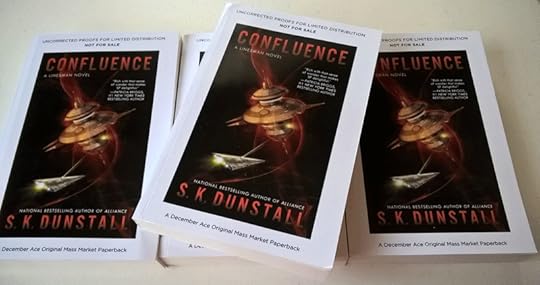 Advance reader copies, or ARCs. Also known as galleys.
Advance reader copies, or ARCs. Also known as galleys.The advance reader copies of Confluence arrived on Thursday. These are books but without the final proof read. They have typos. Hopefully not too many.
(I opened the book to a random page and the first thing I saw was a comma that shouldn’t be there. I hope we caught that one in the final proof. )
Beautiful white books with coloured covers. We were expecting plain green covers, as that’s what we’d had for the other two books. Look at them. Aren’t they great?
We’re giving a book away.
If you want to win, comment on this blog post. (i.e. Leave a Reply.)
If you’re reading this through Goodreads or Amazon or Facebook or any other feed, please note that you must come to the blog site to comment. Click on this link to get here. (We’re asking you to come to the blog because last time it was hard to be sure that everyone’s comments got counted. Here they’re all in one place.)
Also, your comment must be on this blog post. Comments on other posts won’t count.
There are no location restrictions. We’ll send the book anywhere in the world.
Competition is open until next Sunday’s blog post (10am Australian Eastern Standard time on Sunday 2 October).
Once the competition closes, we’ll use the wholly scientific method of putting all names into a hat (or in our case it, the big aluminium mixing bowl) and we’ll draw a name out.
So if you want to read Confluence early, comment here.
Save
Save
Save
September 17, 2016
Measuring time in space
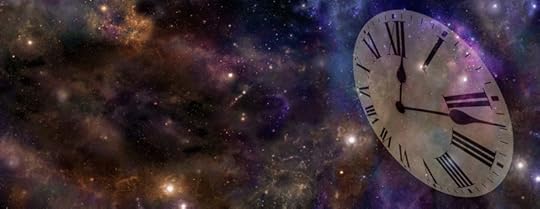 Twenty four hours isn’t a logical time period in space. What would we use instead?
Twenty four hours isn’t a logical time period in space. What would we use instead?Yesterday was a beautiful spring day here in Melbourne, Australia. After a week of heavy rain leading to one of the wettest Septembers on record, the day was glorious. The sun was out, the clouds were white(ish) and there were flowers in every garden.
It’s spring. The weather is getting warmer, the days are getting longer. And it’s light outside when we leave for work. Not yet light when we leave work for home, but that will come. We’ll finally be able to see our garden—which we only see on the weekends in daylight right now. (Thank you, Helen, for making it look so immaculate.)
Like I say, the days are getting longer.
Longer days in summer happen because of the way the Earth tilts toward the sun. The day itself is the time it takes for the Earth to rotate on its axis. A year is the time it takes the Earth to orbit the sun.
Each planet has its own day and year. It may or may not tilt (although tilt is good if you want seasons).
In a spaceship, days, seasons and years are less relevant. When you’re travelling around the galaxy, you don’t care how long the local day or year is. When you move on, the next world will have a different day and year.
So how do you keep time in space?
Human beings have a diurnal rhythm of around twenty-four hours. That’s basically because we are used to Earth’s twenty-four rotation, with its period of light and dark. We tend to wake up in the day, and sleep at night.
In the book we’re currently writing, we use twenty-four hours. It’s an easy time period for readers to imagine. We imagine that ships would have a ‘day’ period of around fourteen hours where the lights were daylight brightness, and a night period of eight hours, where the lights are low.
But is it really a logical period to use?
Probably not.
Years won’t make any sense because each world will have its own year. You’re more likely to have a centralised date, based on multiples of some lesser time periods, and that will be the standard across the whole galaxy.
Think Star Trek star dates.
But what are the lesser multiples that will make up the years?
One thing is likely. Given the human numbering system, it will probably be some variation on a multiple of ten.
Probably the best date system I have ever come across is Vernor Vinge’s seconds, kiloseconds and megaseconds, from his Zones of Thought books. A second is a second. A kilosecond is a thousand seconds. Given there are 3,600 seconds in an hour, this comes out to roughly a quarter of an hour.
Thus a megasecond is 11 days, 13 hours, 46 minutes and 40 seconds, which is roughly of the order of a week. A kilosecond is 16 minutes, 40 seconds, or the length of a short break. A gigasecond 31.7 years, so typical human lifespans are 2 to 3 gigaseconds.
Wikipedia Second
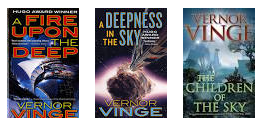 Vernor Vinge’s Zones of Thought series.
Vernor Vinge’s Zones of Thought series.Save
Save
Save
Save
Save
Save
Save
Save
September 10, 2016
How many power points do two writers need?
 Electric lights. Something only half the house has at the moment. Look on the bright side. It’s just finished winter here. It’s dark when we go to work, dark when we get home. If those rooms are dusty, we can’t see it.
Electric lights. Something only half the house has at the moment. Look on the bright side. It’s just finished winter here. It’s dark when we go to work, dark when we get home. If those rooms are dusty, we can’t see it.How many power points do you need for a computer?
Let’s see. There’s the one for the computer itself. One for each of the two screens. A printer. The backup hard drive. That’s five already.
There are two computers in the office. That’s ten power points. Plus the point for the laptop charger, one for the phone charger, and the one for the iPad. (Actually, we plug the iPads into a point in the dining room, for there are no spare points in the office.) Then there’s the router, and the stereo. The list goes on.
This is the second office we’ve had. We added extra power points a couple of years ago we switched the then-study with the dining room.
Our house was built post-World War II. The switches aren’t that old, but a lot of the wiring is. The fuse box is full of empty fuses that even the electrician has no idea what they do. Not to mention, the fuse box itself is no longer legal.
We know the lighting and power needs work. We’ve known that for a while. We’ve had a lot of electrical problems.
So last week, when half the lights in the house went out, and the electrician spent all day trying to find the fault and couldn’t, we weren’t surprised at the verdict.
“You’ll need to rewire the house. And put a new fuse box in.”
“Sure,” we said.
The head electrician came around to inspect the electricals and give us a quote.
Let me tell you, people, if you’re going to get an estimate for rewiring, make sure the power points are accessible (and it’s a good idea if your house is cleanish). The electrician goes into every room.
I got a bit embarrassed about all the power points in the study and the former study. “Twelve power points along that wall. Six along that wall. ” And in the other room. “Ten on that wall, ten on the opposite. Do you want them all put back?”
“Yes,” I said, because we’re actually thinking of shifting back to the old study. It has better light (or until last week it did, now it has none), and it looks out onto the garden, which makes a nice ambience for working.
I’m sure he thought I was crazy.
“And while you’re here, is there anything you’d like added?”
“Well, the kitchen light’s terrible, and we wouldn’t mind a heat/fan/light in the bathroom, and …”
“I’ll send you a quote,” the electrician says.
The quote arrived yesterday.
Ouch. That’s all I can say.
But I’m looking forward to having working lights again. And there’s an added bonus. If we buy new lights they’ll put them in for us as they do the rewiring.
So tomorrow we’re going shopping for lights.
September 3, 2016
First sighting in the wild
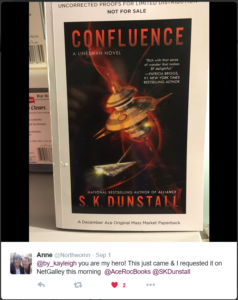 The first glimpse of our latest book — in the wild, as it were.
The first glimpse of our latest book — in the wild, as it were.It’s just under three months until Confluence is released.
And look, advance reader copies are starting to surface.

